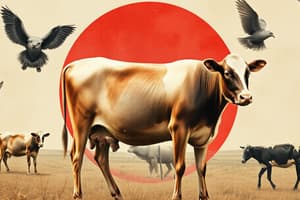Podcast
Questions and Answers
What is the primary focus of the study of animal nutrition?
What is the primary focus of the study of animal nutrition?
- Feed and feeding
- Health, diseases, and well-being (correct)
- Maintenance and productivity
- Product quality and human consumption
What is the purpose of nutrition in animals?
What is the purpose of nutrition in animals?
- To reduce disease occurrence
- To increase productivity
- To enhance product quality
- To support vital body processes (correct)
What is the definition of maintenance in animal nutrition?
What is the definition of maintenance in animal nutrition?
- The state of rapid growth and development
- The ability to produce products such as milk and eggs
- The process of tissue breakdown and repair
- The state in which there is neither gain nor loss of body weight (correct)
What is the consequence of not meeting an animal's maintenance requirement?
What is the consequence of not meeting an animal's maintenance requirement?
What is the term for the ability of an animal to produce products such as meat, milk, and eggs?
What is the term for the ability of an animal to produce products such as meat, milk, and eggs?
What is the process by which food is presented to and utilized by living cells, and waste products are eliminated?
What is the process by which food is presented to and utilized by living cells, and waste products are eliminated?
What is a characteristic of growth in species?
What is a characteristic of growth in species?
What is a factor that influences productivity?
What is a factor that influences productivity?
What is the primary role of nutrition in achieving genetic potential?
What is the primary role of nutrition in achieving genetic potential?
What are micronutrients?
What are micronutrients?
What is the primary difference between food and feed?
What is the primary difference between food and feed?
What is the role of reproduction in productivity?
What is the role of reproduction in productivity?
What is the difference between essential and non-essential nutrients?
What is the difference between essential and non-essential nutrients?
What are the components of nutrients in feed?
What are the components of nutrients in feed?
What is the primary factor that affects feed costs?
What is the primary factor that affects feed costs?
What is the term for a disruption to regular bodily structure and function?
What is the term for a disruption to regular bodily structure and function?
What type of feeding is suitable for poultry?
What type of feeding is suitable for poultry?
What determines the value of a feed?
What determines the value of a feed?
Flashcards are hidden until you start studying
Study Notes
Non-Essential Nutrients
- Non-essential nutrients cannot be synthesized in sufficient quantities by the body to meet its needs.
- Essential nutrients must be obtained from the diet.
Feed Comparison
- Not all feeds are equal; varies in nutrient composition and digestibility.
- Chicken and rice provide different nutritional profiles.
- Grass and corn also differ in nutrient composition and digestibility.
Components of Nutrients in Feed
- Key components of feed: water, carbohydrates, proteins, lipids, vitamins, and minerals.
- Feed value is influenced by nutritional content, digestibility, palatability, and presence of anti-nutritional factors.
Animal Nutrition Issues
- Insufficient feed risks nutritional deficiencies, growth failure, and mortality.
- Excess feed can cause nutritional toxicity and health disorders.
- Disease stems from responses to internal/external factors; disorders signify structural or functional disruptions.
Livestock Classes and Feeding Methods
- Non-ruminants: Feeding can be restricted or provided ad libitum (free-choice).
- Monogastrics include poultry, which have specific dietary needs.
- Ruminants may vary in size affecting their feeding strategies.
Introduction to Animal Nutrition
- Nutrition is the science of how food nourishes organisms and affects health.
- Focuses on feed, feeding strategies, maintenance, productivity, and health implications.
Nutrition Processes
- Key processes: procurement, ingestion, digestion, metabolic functions, absorption, and excretion.
- Nutrient interactions influence physiological responses in the body.
Nutritional Requirements for Animals
- Requirements include maintenance, growth, and production (e.g., reproduction, products like meat and milk).
- Maintenance ensures the animal's vital functions without weight gain or loss.
Growth and Production Factors
- Growth is influenced by species characteristics, age, and individual variability.
- Production needs include supporting muscle, bone, organ development, and reproductive processes.
Impact of Nutrition on Productivity
- Individual genetic potential, species, age, and management factors influence productivity.
- Nutrition quality and quantity are essential in realizing genetic potential.
Nutrients Overview
- Nutrients are compounds vital for bodily functions and include macronutrients (water, minerals, carbohydrates, proteins, lipids) and micronutrients (vitamins, minerals).
- Different nutrients serve various roles: energy provision, tissue building, and regulation of bodily processes.
Studying That Suits You
Use AI to generate personalized quizzes and flashcards to suit your learning preferences.




